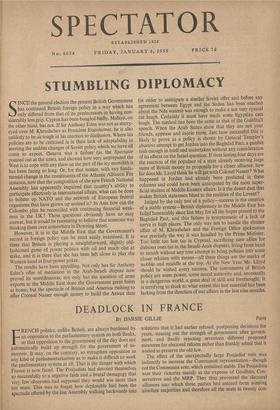STUMBLING DIPLOMACY
SINCE the general election the present British Government has continued British foreign policy in a way which has only differed from that of its predecessors in having con- siderably less grip. Cyprus has been bungled badly. Malaya, on the other hand, has not. if Sir Anthony Eden was not as starry- eyed over M. Khrushchev as President Eisenhower, he is also unlikely to be as tough in his reaction to disillusion. Where his policies are to be criticised is in their lack of adaptability in meeting the sudden changes of Soviet policy which we have all come to expect. Geneva was a failure (as the Spectator pointed out at the time), and showed how very unprepared the West is to cope with any thaw on the part of the icy monolith it has been facing so long. Or, for that matter, with any funda- mental change in the constituents of the Atlantic Alliance. For instance, now that the composition of the new French National Assembly has apparently impaired that country's ability to participate effectively in international affairs, what can be done to bolster up NATO and the network of European federal organisms that have grown up around it? In Asia how can the Colombo plan be reconciled with continuing financial weak- ness in the UK? These questions obviously have no easy answer, but it would be reassuring to believe that someone was thinking them over somewhere in Downing Street.
However, it is in the Middle East that the Government's record in foreign policy can be most easily examined. It is there that Britain is playing a straightforward, slightly old- fashioned game of power politics with oil and much else at stake, and it is there that she has been left alone to play the Western hand at four-power poker.
The results have been appalling. Not only has Sir Anthony Eden's offer of mediation in the Arab-Israeli dispute now proved its worthlessness; not only has the question of arms exports to the Middle East done the Government great harm at home; but the spectacle of Britain and America rushing to offer Colonel Nasser enough money to build the Aswan dam (in order to anticipate a similar Soviet offer and before any agreement between Egypt and the Sudan has been reached about the Nile waters) was enough to make a not very cynical cat laugh. Certainly it must halve made some Egyptian cats laugh. The method has been the same as that of the Guildhall speech. When the Arab States show that they are not your friends, appease and cajole them. Just how successful this is likely to prove as a policy is shown by Gene:al Templer's abortive attempt to get Jordan into the Baghdad Pact, a gambit rash enough in itself and undertaken without any consideration of its effects on the Israel question. If riots lasting four days are the reaction of the populace of a state already receiving large sums of British money to proposals for a closer alliance, how far does Mr. Lloyd think he will get with Colonel Nasser? What happened in Jordan had already been predicted in these columns and could have been anticipated by the most super- ficial student of Middle Eastern affairs. Is it the desert dust that makes British statesmen blind to the realities of the Levant?
Judged by the only test of a policy—success in the creation of a stable system—British diplomacy in the Middle East has failed lamentably since last May for all the hopes pinned to the Baghdad Pact, and this failure is symptomatic of a lack of nerve in high places. The only way not to handle the sinister affair of M. Khrushchev and the Foreign Office spokesman was precisely the way it was handled by the Prime Miifister. Too little too late (as in Cyprus), sacrificing sure allies for dubious ones (as in the Israeli-Arab dispute), living from hand to mouth without any true attempt to bring policies into some closer relation with means—all these things are the marks of wobble and muddle at the top. At the New Year Mr. Lloyd should be wished every success. The instruments of British policy are some power, some moral authority and, necessarily in a dangerous world, a great deal of skill and forethought. It is terrifying to think to what extent this last essential has been lacking from the direction of our affairs in the last nine months.


































 Previous page
Previous page